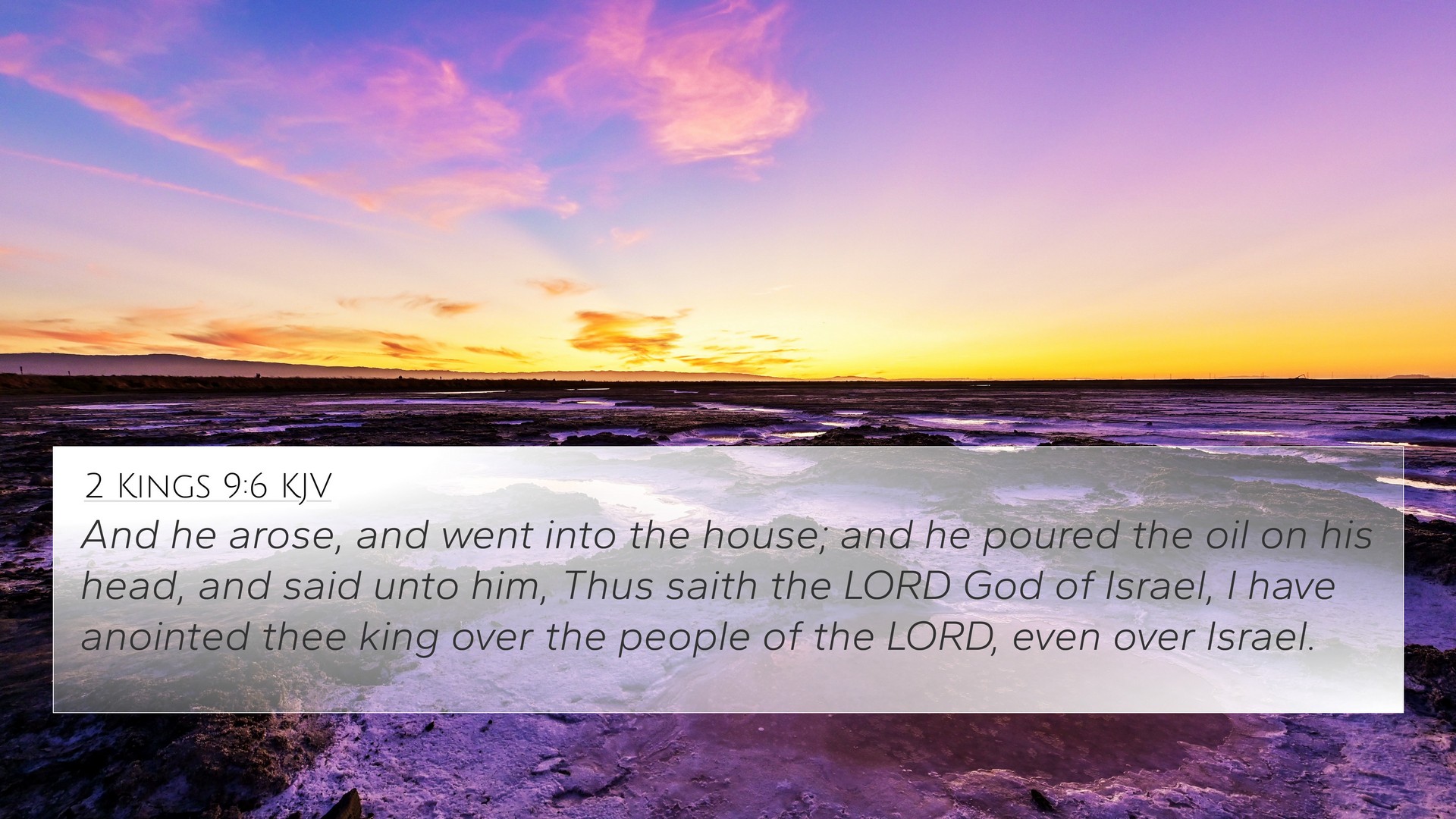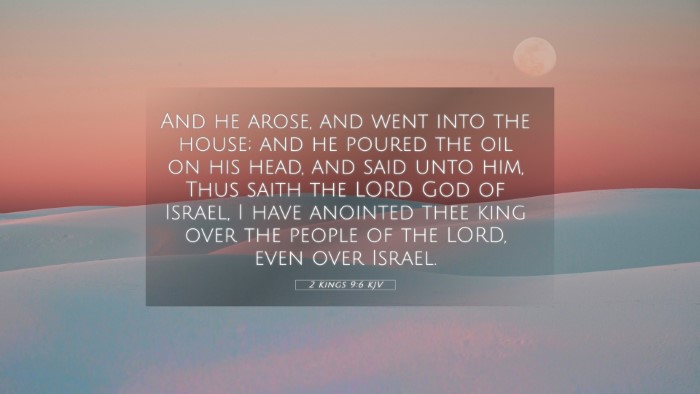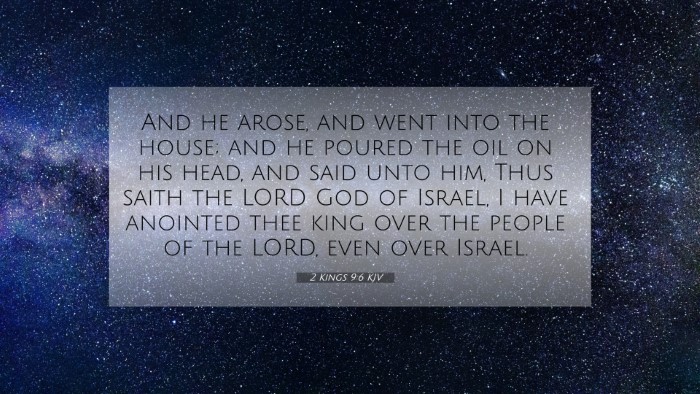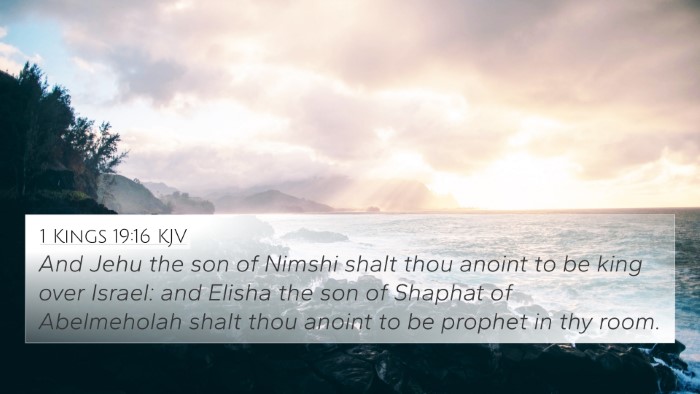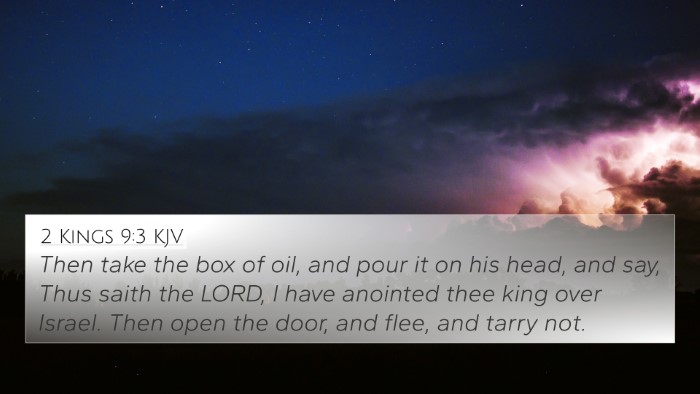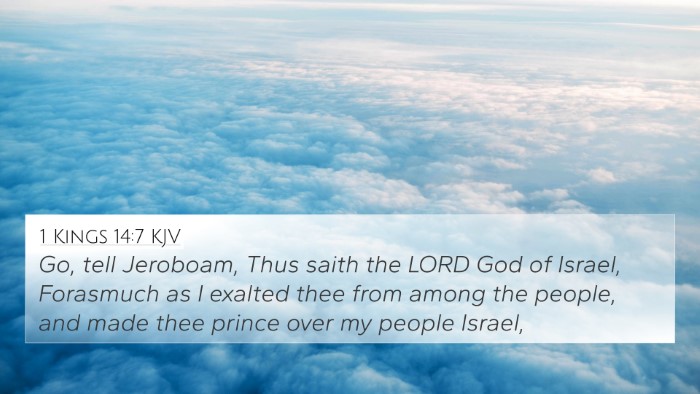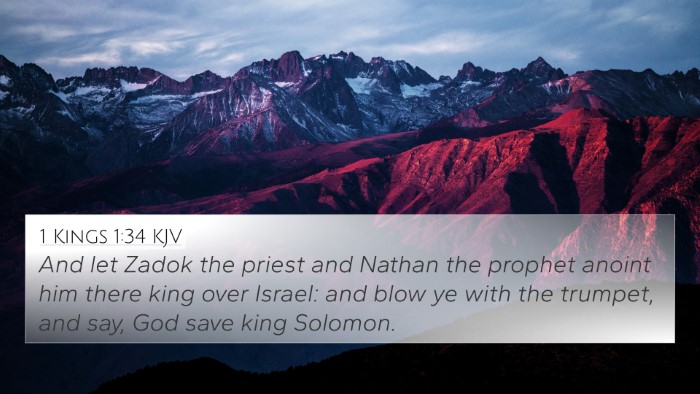Understanding 2 Kings 9:6
2 Kings 9:6 marks a pivotal moment in the history of Israel, where the anointing of Jehu signals a significant shift in leadership and divine purpose. In this verse, the prophet Elisha sends a young prophet to anoint Jehu, thus marking him as the chosen instrument for judgment upon the house of Ahab. This event is rich in symbolism and prophetic meaning.
Contextual Overview
This verse falls within a larger narrative that details God’s judgment against the house of Ahab due to their idolatry and wickedness. Jehu's anointing is not merely a political movement but also a divine mandate, emphasizing God's sovereignty over Israel’s direction and leadership.
Key Points from Commentaries
- Matthew Henry: Henry emphasizes that the anointing of Jehu was a divinely orchestrated event, intended to fulfill God’s promise to eradicate Ahab’s dynasty. This underscores the idea that God raises and removes kings according to His will.
- Albert Barnes: Barnes notes that the action of anointing was fundamental to the establishment of a king in Israel, symbolizing God’s choice and the impartation of authority. He also highlights the prophetic significance of this act, which indicates a new beginning for Israel.
- Adam Clarke: Clarke elaborates on the role of the young prophet, who was obedient to God's command. This act of carrying out divine instructions reflects the importance of faithfulness in the prophetic ministry.
Significance of Anointing
The anointing of Jehu serves as a powerful symbol of God's selection. Anointing, in biblical texts, represents the consecration of individuals for specific purposes. It serves as a reminder that leadership in Israel was to be governed by divine appointment rather than human desires.
Cross-References
This verse connects deeply with other biblical texts that highlight themes of divine appointment, judgment, and leadership:
- 1 Samuel 16:12-13: The anointing of David, where God directs Samuel to anoint a new king over Israel.
- 2 Kings 1:16: The prophetic authority given to Elijah and how it impacts the rule over Israel.
- 1 Kings 21:21: God speaks judgment upon Ahab's house due to his wickedness.
- Jeremiah 1:10: Illustrates the uprooting and tearing down of nations as a parallel to Jehu's commission.
- Isaiah 45:1: God’s choice of Cyrus as a leader serves as a connection to the theme of divine appointment for a purpose.
- Revelation 6:10: The cries of the martyrs underline God's judgment, akin to the judgment executed by Jehu.
- Hosea 1:4: Emphasizes God’s judgment against the house of Jehu for the bloodshed, linking back to his anointing.
Thematic Connections
There are several thematic connections that can be drawn from 2 Kings 9:6:
- Divine Sovereignty: The placement of leaders is under God's authority.
- Judgment: Jehu’s mission is a direct response to Israel’s moral decline.
- Prophetic Fulfillment: The act of anointing fulfills God’s prior declarations through prophets concerning Ahab’s lineage.
Understanding the Role of Prophets
The young prophet represents the unyielding voice of God amidst a corrupt society. His obedience in delivering God’s message illustrates the necessity for fidelity to God’s commands, even in difficult cultural circumstances.
Conclusion
In summary, 2 Kings 9:6 serves as a crucial reminder of God’s sovereignty in the affairs of men. The anointing of Jehu is a powerful depiction of God’s intervention in Israel to effect judgment and restore righteousness. Understanding this verse through cross-referencing highlights the interconnectedness of scriptural themes and God's overarching narrative of redemption and judgment.
Exploring Cross-Referencing in Scripture
For those interested in exploring the depths of Biblical themes and cross-references, several tools can aid in your study:
- Bible Concordance: A useful tool to identify specific verses related to chosen themes or subjects.
- Bible Cross-Reference Guide: Helps in locating connections and parallels between different scriptures.
- Cross-Reference Bible Study: Engaging with multiple verses to gain a comprehensive understanding of themes.
